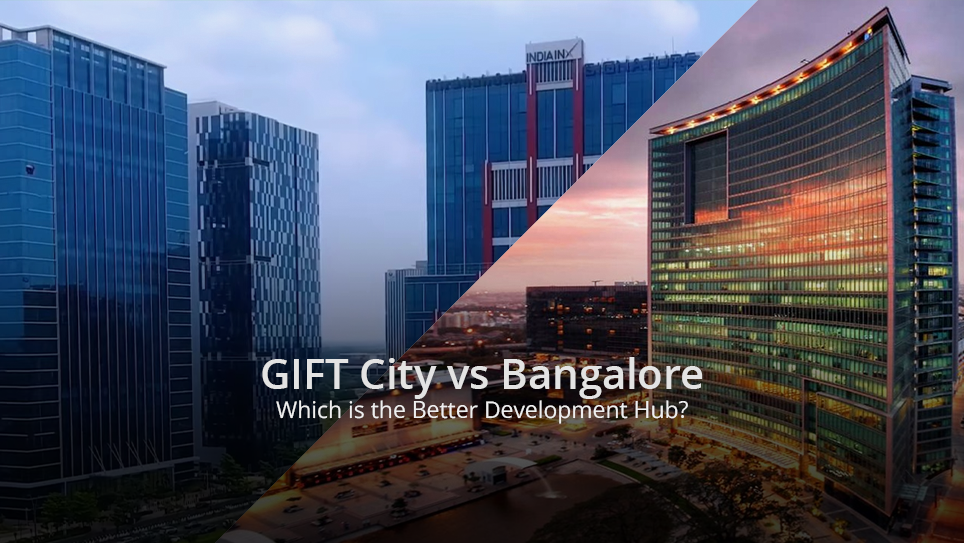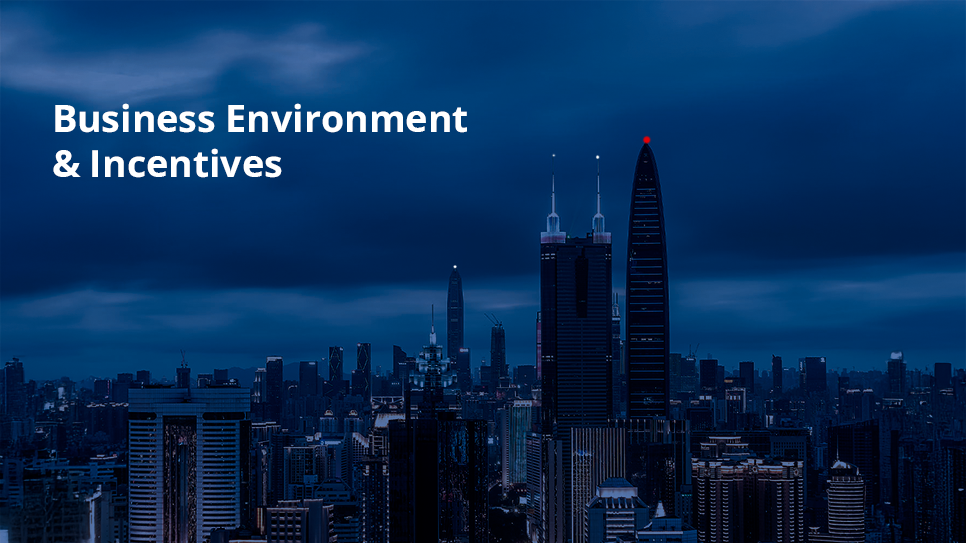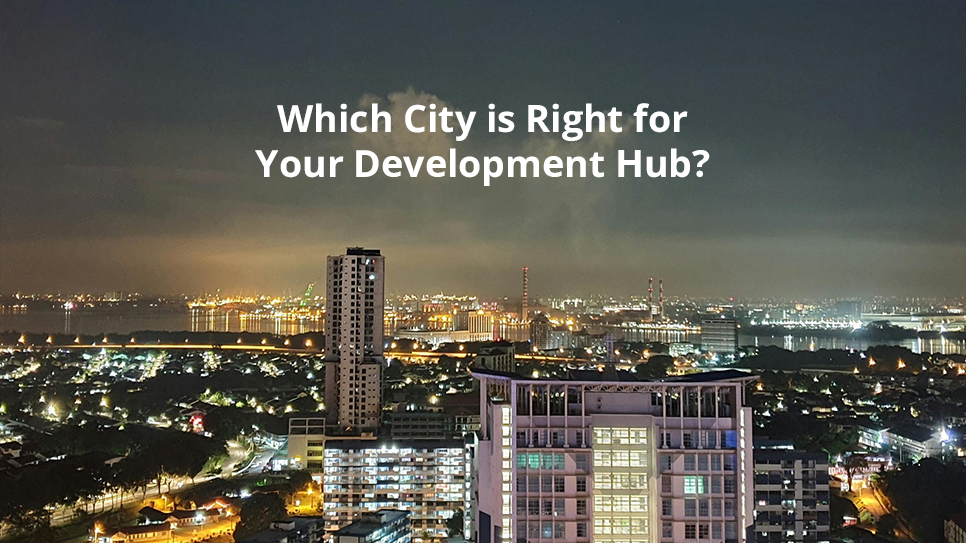GIFT City vs Bangalore: Best Development Hub in India

India’s booming tech and finance sectors have put two cities in the spotlight for companies choosing their next development hub: Bengaluru (also known as Bangalore) and Gujarat’s GIFT City. Bangalore has long been dubbed “India’s Silicon Valley,” with over one million tech workers and 28 unicorn startups housed there. It’s widely recognized as the country’s premier startup hub. By contrast, GIFT City (Gujarat International Finance Tec-City) is a planned smart city and India’s first International Financial Services Centre (IFSC), created as a financial hub with world-class infrastructure. Both offer unique pros and cons for CTOs, founders, and tech recruiters. In this guide, we compare key factors—infrastructure, business incentives, talent pools, and examples of companies—to help you decide which city fits your organization’s needs for a new development hub.
Considering GIFT City or Bangalore for your next development hub? This guide covers:
- Key strengths and weaknesses of each city
- Talent pool, infrastructure, and cost comparisons
- Industry fit: Which hub suits fintech, AI, and product teams
- Tax incentives and regulatory advantages in GIFT City
- Strategic insights to help you pick the right location
This blog builds on FX31 Labs’ ongoing focus on India’s top innovation corridors. If you’re expanding tech operations or hiring engineering teams, these insights will help you plan with confidence.
Bangalore: India’s Established Tech and Startup Powerhouse
Bangalore is often called India’s “tech capital.” It hosts hundreds of tech parks and multinational R&D centers, and has been home to many of India’s tech pioneers (like Infosys and Wipro) and unicorns. In 2025, Bengaluru’s tech workforce topped one million, placing it among the world’s top tech hubs alongside San Francisco and Shanghai. The city’s premier educational institutions and research centers continually supply engineers and developers, fueling its innovation ecosystem.
- Startup Ecosystem & Unicorns: Bengaluru’s startup ecosystem is second to none in India. It accounts for a huge share of national unicorn valuations. In 2024 alone, Bangalore-based startups like Ather Energy (electric vehicles) and MoneyView (fintech) reached unicorn status.
- Tech Infrastructure: The city boasts numerous Grade-A tech parks that house global firms like TCS, IBM, Microsoft, Accenture, and others. For example, International Tech Park Bangalore (ITPB) provides a built-in mall, hotel, and metro access, and is home to IBM, Oracle, Wipro, and more.
- Quality of Life & Talent: As a mature metro, Bangalore offers a cosmopolitan lifestyle, abundant housing, schools, hospitals, and entertainment. Its pleasant climate and established city infrastructure attract talent from across India. The city’s college graduates and experienced developers are plentiful, thanks to prestigious institutes and numerous engineering colleges. This large, skilled labor pool is a big draw for companies setting up development hubs.
Bangalore’s main strengths are its deep talent pool, proven startup ecosystem, and mature tech infrastructure. As a “Bangalore startup hub”, it provides instant credibility, networking, and access to venture capital. However, it faces challenges like high real estate and labor costs, traffic congestion, and talent competition.
GIFT City: India’s New Smart Financial & Tech Hub
GIFT City is a greenfield smart city about 15 km from Ahmedabad, Gujarat. It is India’s first operational IFSC (International Financial Services Centre) and Special Economic Zone. GIFT City infrastructure was built from scratch with global standards: it has uninterrupted power, treated water, fiber-to-the-building connectivity, and is 5G-ready. The city has a world-class data center and 15 telecom operators, ensuring high-speed internet and reliable networks.
- Financial & Regulatory Incentives: GIFT City is explicitly designed as an international financial hub. It lies within an SEZ/IFSC with special regulations. Companies in GIFT City enjoy tax breaks and simplified norms not available on the mainland.
- Emerging Tech Presence: While finance is the focus, GIFT City also encourages tech companies, especially fintech. It already hosts ~35 fintech startups and has established the Fintech International Institute (IFI) and Innovation Hub (IFIh) with partners like Ahmedabad University and IIT Gandhinagar to train talent.
- Notable Companies in GIFT City: Major global and domestic banks have opened IFSC units here. For example, Standard Chartered Bank operates a full-service branch in GIFT City. Likewise, Bandhan Asset Management launched its IFSC branch at GIFT City in 2025 to offer India-focused mutual funds to international investors.
GIFT City’s main attractions are its modern infrastructure and business-friendly policies. As a planned smart city, it offers clean utilities, high-speed internet, and a live-work-play environment that is still under development. Companies there gain generous tax and regulatory perks geared toward finance and tech.
Comparing Infrastructure & Connectivity
- Road & Transit: Bangalore is an established city with two national highways connecting it to major metros, an international airport (Kempegowda Intl.) handling flights worldwide, and India’s second-largest bus and rail network. The Namma Metro is expanding to cover key tech areas.
GIFT City, by contrast, is a purpose-built district: it’s adjacent to Ahmedabad and served by the Sardar Vallabhbhai Patel International Airport (just 15 km away). Highways like the Delhi–Mumbai Expressway and the upcoming bullet train line will connect GIFT City to Mumbai and Delhi. Within GIFT City itself, eco-friendly electric buses run to Ahmedabad/Gandhinagar, with plans for pod taxis and a metro loop.
- Digital Infrastructure: Bangalore enjoys excellent internet and mobile coverage (with 4G/5G) from multiple operators. However, GIFT City was designed for cutting-edge connectivity: every office tower has fiber optic links and direct links to a dedicated data center. Over 15 carriers serve the campus, enabling robust international bandwidth. GIFT City even markets itself as having blockchain-ready systems and district cooling, making it extremely attractive to tech-driven firms.
For software development, both cities offer reliable power and broadband, but GIFT City’s built-in smart city technology and net-zero power interruptions can give it an edge as a modern “development hub.”
- Office Space & Co-Working: Bangalore has thousands of square feet of ready office space in parks and business centers, plus many coworking chains. GIFT City is growing its stock: currently, ~20 million sq ft. of offices have been allotted, with more high-rises (e.g. Gift One, Gift Two towers) coming up. Specialized spaces like DevX offer startup-friendly campuses. Rental costs in GIFT City are generally lower than Bangalore’s prime IT corridors.
Overall, GIFT City infrastructure scores very high on planning, sustainability, and world-class connectivity. Bangalore’s infrastructure is proven and abundant, but the city grapples with congestion and aging roads. From an IT development perspective, GIFT City’s new-age facilities make it a very compelling alternative hub, while Bangalore offers scale and maturity.
Business Environment & Incentives

- Taxes & Regulations: GIFT City’s SEZ/IFSC status means significant incentives. Startups and companies there benefit from lower taxes and simpler compliance. For example, a fintech startup in GIFT City can operate tax-free for years, use a single regulator, and list on the INX exchange. Bangalore’s advantage is the established business ecosystem and Karnataka state support (start-up policies, innovation grants), but it has no comparable tax holiday. Corporations in Bangalore pay the regular corporate tax rates and must navigate multiple authorities.
- Economic Specialization: Bangalore’s economy is very broad: IT services, product tech, biotech, aerospace, etc. This diversity means many industry clusters (software, gaming, life sciences). GIFT City, by design, focuses on finance and technology. Its domestic tariff area (DTA) is open for almost any business, but the IFSC specifically attracts banks, asset managers, insurance, and fintech. Thus, companies in financial tech, trading, or global corporate treasury roles may find GIFT City especially aligned with their business models.
- Government Support: Both Karnataka and Gujarat offer incentives for businesses. Karnataka has various IT parks and rebates, while Gujarat’s investment climate is pro-business. Notably, the central government and the RBI have actively promoted GIFT City – for example, the RBI has permitted banks to have IFSC branches there. Recently, even Karnataka has expressed interest in a “GIFT City-like” zone to retain talent locally. This signals that GIFT City is strongly backed by policy, making it potentially more supportive of new ventures in finance/IT.
Talent Pool & Workforce
Bangalore:
The city is famed for its deep tech talent pool. It draws skilled engineers, developers, and data scientists from all over India and even globally. According to CBRE research, Bengaluru is among the world’s top tech talent markets, rivaling New York and San Francisco. Companies setting up a development center here gain access to experienced AI and software specialists and benefit from the existing training infrastructure. Global Capability Centers have thousands of Indian tech employees in Bangalore, indicating ample human resources. The size of the workforce also means that headcounts can scale up quickly as a development hub expands.
GIFT City:
As a greenfield zone, GIFT City’s local talent base is smaller. Many startups in GIFT City will recruit from nearby Ahmedabad or transfer employees from offices in metro cities. However, it aims to grow its talent supply: initiatives like the International Fintech Institute (IFI) and partnerships with local universities (Ahmedabad Univ., IIT Gandhinagar) are ramping up fintech and tech education. The presence of 60+ tech startups and 35+ Global Capability Centers in the Ahmedabad–GIFT corridor suggests a budding tech community. GIFT City can also draw talent from major metros with relocation incentives.
Work Culture: Bangalore is known for a cosmopolitan, fast-paced work culture with flexible start-up vibes. GIFT City, being corporate and finance-oriented, tends to have a more formal business environment, at least initially. However, coworking spaces and incubators in GIFT City aim to create a startup-friendly atmosphere. Both cities have English as the main business language and attract global talent.
Costs and Quality of Life
- Cost of Operations: Generally, office and living costs are lower in GIFT City/Ahmedabad than in Bangalore. Bangalore’s real estate, utilities, and salaries can be among the highest in India. GIFT City offers more competitive rates for office space and accommodations, which is attractive for new centers looking to optimize budgets. Companies should compare salaries and lease costs closely.
- Quality of Life: Bangalore is a large metro with diverse cultural life – shopping, dining, international schools, hospitals, and pleasant weather. Traffic and pollution are downsides. GIFT City is newer and quieter. It provides a cleaner environment and is planned to include apartments, parks, and sports complexes. An international school and healthcare facilities are already open. However, entertainment and social options are more limited; expatriates or families might find it less lively than Bangalore. For businesses, quality-of-life factors affect talent attraction: some employees prefer Bangalore’s buzz, while others appreciate GIFT City’s calm and modern design.
Which City is Right for Your Development Hub?

The choice depends on your priorities. If you need a mature ecosystem with abundant tech talent, deep startup culture, and you’re building a general software or product development center, Bangalore is hard to beat. It offers instant “ready-made” infrastructure and networks. Bangalore is especially strong for consumer Internet, SaaS, enterprise software, biotech, and emerging tech (AI/ML, semiconductors).
On the other hand, if your development hub is finance- or blockchain-focused, or if you want cutting-edge infrastructure and heavy incentives, GIFT City could be very attractive. Its position as a GIFT City financial hub means unrivaled tax breaks and a concentration of banks and financial data – ideal for fintech, trading platforms, or any fintech-adjacent tech center. GIFT City also appeals if lower cost and a new, green environment are important.
Key Takeaways:
- Bangalore strengths: Massive tech talent pool (1 M+ engineers), thriving startup culture, established IT parks and metro connectivity, and a proven track record of unicorns. High costs and congestion are downsides.
- GIFT City strengths: State-of-the-art infrastructure (5G-ready, data centers, reliable utilities); financial incentives (tax holidays, simplified IFSC rules); presence of global banks and fintech focus. The ecosystem is still growing, so access to talent and amenities is less compared to a big city.
- Industry fit: Bangalore suits pure tech/software development and consumer/p2p apps; GIFT City is ideal for fintech, banking software, blockchain, cryptocurrency firms, and any company that benefits from IFSC status.
- Future outlook: Both cities are on upward trajectories. Bangalore continues to climb global tech rankings, while GIFT City is expanding (plan to triple area by 2033) and adding companies (550+ soon).
Conclusion
There is no one-size-fits-all answer. A neutral, objective assessment suggests: choose Bangalore if your priority is a ready ecosystem with an ample tech workforce, and you are prepared for higher costs. Choose GIFT City if you want modern infrastructure and regulatory perks (especially for finance-related tech) at a lower cost, and can tolerate a less mature startup culture. Many companies even opt for both: for instance, they keep their product development center in Bangalore and open a finance tech team in GIFT City. Ultimately, assess your specific needs (talent vs. incentives, scale vs. specialization) to decide which development hub will best serve your growth plans.
FAQ’s
1. Which city is better for startups: Bangalore or GIFT City?
Bangalore is generally better for pure tech startups due to its massive talent pool and established ecosystem. GIFT City, however, is ideal for fintech startups or companies needing financial incentives and modern infrastructure. Choose Bangalore for tech scale and GIFT City for financial benefits and lower operational costs.
2. What are the main tax benefits of GIFT City?
Companies in GIFT City’s International Financial Services Centre (IFSC) enjoy significant tax breaks, including a 10-year tax holiday, exemptions on GST for services provided to IFSC units, and lower Minimum Alternate Tax (MAT). These incentives make it highly attractive for financial services and fintech companies.
3. Is it hard to find tech talent in GIFT City?
Finding tech talent in GIFT City can be more challenging than in Bangalore, which has a vast, readily available workforce. However, GIFT City is growing its talent pool through partnerships with universities and relocation incentives. Many companies also transfer staff or recruit from nearby Ahmedabad to bridge the gap.
4. How does the cost of living compare between the two cities?
The cost of living and operating a business is significantly lower in GIFT City compared to Bangalore. Real estate, utilities, and salaries are more affordable in GIFT City, making it a budget-friendly option for setting up a new development hub without the high overheads of a major metro.
5. Can a company have offices in both cities?
Yes, many companies choose a hybrid approach. They maintain their core product development teams in Bangalore to leverage its deep tech talent while opening a specialized finance or fintech unit in GIFT City to take advantage of its regulatory benefits and modern infrastructure. This strategy maximizes the strengths of both locations.
